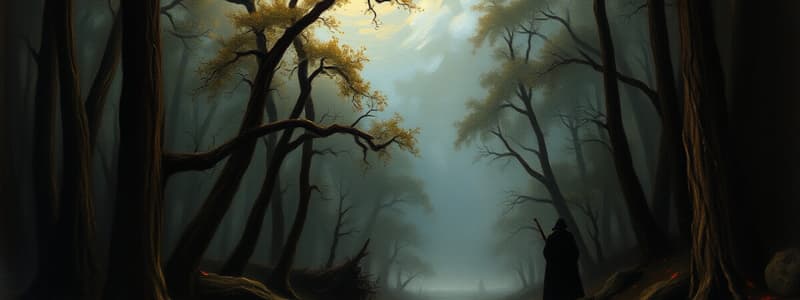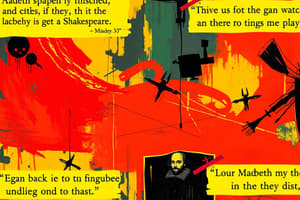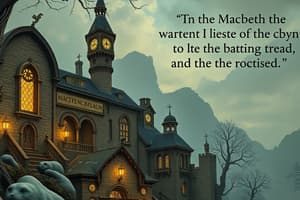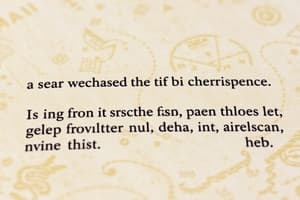Podcast
Questions and Answers
Who says the quote 'Fair is foul, and foul is fair'?
Who says the quote 'Fair is foul, and foul is fair'?
- Banquo
- Macbeth
- Lady Macbeth
- Witches (correct)
What does Macbeth mean when he says, 'Let not light see my black and deep desires'?
What does Macbeth mean when he says, 'Let not light see my black and deep desires'?
He hopes his disappointment over Malcolm becoming king doesn't show.
What does Lady Macbeth fear about Macbeth's nature?
What does Lady Macbeth fear about Macbeth's nature?
She fears he is too kind to kill Duncan.
What advice does Lady Macbeth give Macbeth regarding his behavior towards Duncan?
What advice does Lady Macbeth give Macbeth regarding his behavior towards Duncan?
Who does Lady Macbeth call upon to rid her of her femininity and fill her with cruelty?
Who does Lady Macbeth call upon to rid her of her femininity and fill her with cruelty?
What does Lady Macbeth mean by 'screw your courage to the sticking-place'?
What does Lady Macbeth mean by 'screw your courage to the sticking-place'?
What does Macbeth mean by 'false face must hide what false heart doth know'?
What does Macbeth mean by 'false face must hide what false heart doth know'?
Why does Lady Macbeth say she would have killed Duncan herself?
Why does Lady Macbeth say she would have killed Duncan herself?
What does Macbeth wonder about after killing Duncan with the line 'Will all great Neptune's ocean wash this blood clean from my hand?'?
What does Macbeth wonder about after killing Duncan with the line 'Will all great Neptune's ocean wash this blood clean from my hand?'?
What is Macbeth hallucinating when he asks, 'Is this a dagger which I see before me'?
What is Macbeth hallucinating when he asks, 'Is this a dagger which I see before me'?
What does Banquo imply with 'Thou play'dst most foully for't'?
What does Banquo imply with 'Thou play'dst most foully for't'?
Why does Macbeth say he should not kill Duncan, referring to their relationship?
Why does Macbeth say he should not kill Duncan, referring to their relationship?
What does Lady Macbeth mean by saying, 'A little water clears us of this deed'?
What does Lady Macbeth mean by saying, 'A little water clears us of this deed'?
Flashcards are hidden until you start studying
Study Notes
Witches' Prophecy
- "Fair is foul, and foul is fair" emphasizes the theme of supernatural influence and moral ambiguity.
- Signals the unsettling, supernatural atmosphere that permeates the play.
Macbeth's Ambition
- "Let not light see my black and deep desires" conveys Macbeth's internal conflict and ambition after Duncan names Malcolm as heir.
- Reflects the beginning of his treacherous thoughts and foreshadows his descent into darkness.
Lady Macbeth's Perception
- "Yet do I fear thy nature; it is too full of the milk of human kindness" reveals Lady Macbeth's doubt about Macbeth's ruthlessness.
- Highlights her ambition and determination for her husband to overcome his moral hesitation.
Deception and Appearance
- "Look like the innocent flower, but be the serpent under't" demonstrates Lady Macbeth's advice to Macbeth to mask his true intentions.
- Illustrates the theme of appearance versus reality, essential to the characters' plots and machinations.
Lady Macbeth's Transformation
- "Come, you spirits... Of direst cruelty!" shows Lady Macbeth's desire to shed her femininity and adopt masculine cruelty to compel Duncan's murder.
- Indicates her commitment to ambition and the lengths she will go to achieve power.
Reassurance Before the Murder
- "But screw your courage to the sticking-place, and we'll not fail" reflects Lady Macbeth's role as a manipulator and instiller of courage in Macbeth.
- Reinforces the couple’s partnership in crime and shared ambition.
Guilt and Facade
- "False face must hide what false heart doth know" underscores Macbeth's internal struggle between guilt and the need to deceive.
- Reveals his awareness of the moral implications of their plan, despite his determination to proceed.
Lady Macbeth's Hesitation
- "Had he not resembled My father as he slept, I had done't" shows Lady Macbeth’s brief moment of compassion, revealing her human side.
- Establishes the emotional complexity of her character amidst her fierce ambition.
Consequences of Murder
- "What hands are here? Ha: they pluck out mine eyes" illustrates Macbeth's immediate remorse and horror post-Duncan’s murder.
- Symbolizes the permanence of guilt and the psychological consequences faced by the characters.
Hallucination of Murder
- "Is this a dagger which I see before me?" signifies Macbeth’s guilt and descent into madness before he commits the murder.
- Reflects the themes of ambition and moral conflict as he grapples with his violent intentions.
Banquo's Doubts
- "Thou hast it now: King, Cawdor, Glamis, all..." reveals Banquo’s suspicion of Macbeth's rise to power.
- Highlights the themes of trust and betrayal, as Banquo contemplates the means by which Macbeth attained his titles.
Moral Conflict
- "He's here in double trust" presents Macbeth's rationale for why he should not kill Duncan, emphasizing loyalty.
- Captures the moral struggle that defines Macbeth as he weighs personal ambition against duty.
Attempt to Ease Guilt
- "A little water clears us of this deed" reflects Lady Macbeth’s initial belief that they can wash away their guilt and sin.
- Demonstrates a stark contrast to the psychological searing guilt that ultimately consumes both characters.
Studying That Suits You
Use AI to generate personalized quizzes and flashcards to suit your learning preferences.




